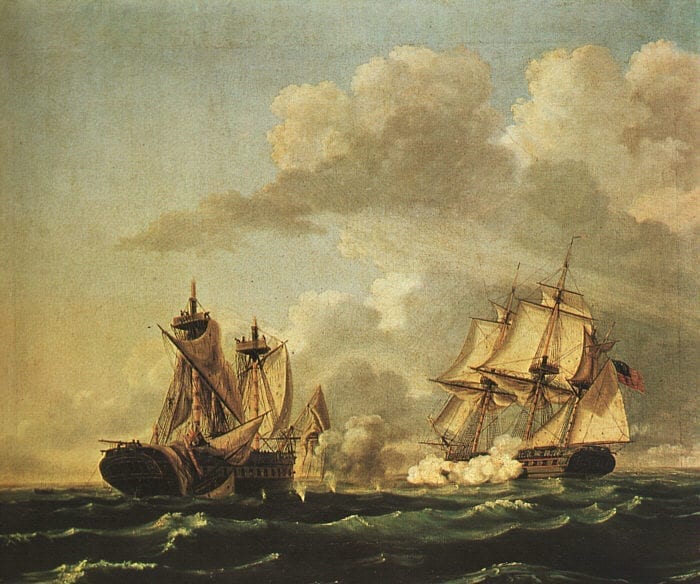The universal sentiment against a British War which prevails among considerate men of all parties in this section of the Union, is accompanied by a natural, but perhaps a false security in the conviction of the impossibility of this event. With the exception of a few brawlers in the street, and of some office-holding editors, we can find none who seriously wish to promote this calamity. It is evident that under the circumstances of this country a declaration of war would be in effect a license and a bounty offered by our government to the British Fleet to scour our coasts – to sweep our remaining navigation from the ocean, to annihilate our commerce, and to drive the country, by a rapid declension, into the state of poverty and distress which attended the close of the revolutionary struggle. We are convinced of the absence of those exasperated feelings in the great body of the people which would impel them to such a conflict. We fathom the length and depth of the artificial excitement, which is attempted by men of desperate fortunes and character, and we are satisfied that, in their efforts to influence the public mind, they apply their blazing torches to a mountain of ice. Other considerations come in aid of our confidence. The proposed enemy is invulnerable to us, while we are on all sides open to assault. The conquest of Canada would be less useful to us than that of Nova-Zembla, and could not be so easily achieved. Our red brethren forgetful of the patriotic “talks” of their “father” Jefferson would pour down upon our frontier, and our black brethren would show themselves not less enamoured with the examples of liberty taught in St. Domingo than their masters are with those derived from its mother country. New-Orleans and the Floridas would pass into the hands of the enemy. Our seaports would be under strict blockade, and the mouths of our rivers would be bridged with frigates. Besides the war would be interminable, or end in a surrender on our part of the objects of contention. If the British nation, which now copes with a world in arms, should yield to us – a people destitute of naval force and capable of contact with her in only one point; whatever may be our internal strength, and national valour; it must be through feelings of complacence and affection, inspired by the known partiality of our Presidents, Governors, and Members of Congress, expressed in the public proceedings. Secluded from the world and oppressed by taxes, idle for want of employment, and indigent because idle, this once happy people would repine with maddening recollection of the days of their prosperity. Discontent, sedition and public commotions would ensue. The swords of the new army must not be suffered to rust “for lack, of somebody to hew and hack;” and civil discord would probably finish the catalogue of evils arising from such a state. A fair experiment has shown that the men beyond the Potommac who are the chief instigators to war have no money to apply to this object; and that the men on this side of it, will not part with theirs to accelerate their own ruin. It is no longer doubtful that the Eastern States, are invincibly opposed to war, and that nothing short of a conscription will fill an army for the foolish crusade. It is not less evident that our people will sooner become volunteers to drive from power the men who shall plunge them into a ruinous war, than conscripts to carry it on. Under an impression of this state of public opinion, confirmed by all we see and hear among our own people, we can hardly believe in the existence of a spirit of infatuation capable of urging our government to such an extremity. The men whose voice in Congress is for war, appear to be acting a theatrical part, and we impute their rant and violence to their feelings and dispositions rather than to ultimate and settled purpose.
It is well to be prepared for disappointment in these calculations. It is well for us to begin to think, how we shall be disposed to act, when we find ourselves in fact, the subjects of men from other States, who are devoid of sympathy for our interests, respect for our character, ignorant of our habits — who mock at our calamity and laugh when our fear cometh.



